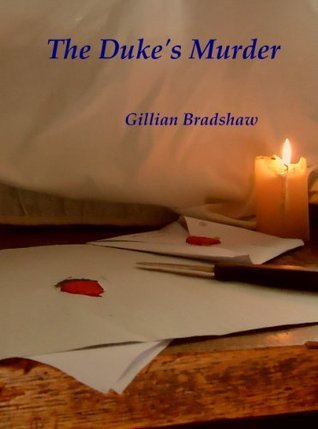Recent Reading: The Magic’s Poison series by Gillian Bradshaw
Magic’s Poison
The Enchanted Archive
The Duke’s Murder
The Iron Cage

Okay, I realize that my enthusiasm for the first book in this series was somewhat muted. But now I want to more strongly recommend the whole series, for three reasons:
a) The third and fourth books are much more compelling than the first two, and
b) Bradshaw does something really interesting and unusual with this series, and
c) You need to read the whole series in order so that you can appreciate the above two points.
The first two books take place three years apart and feature
the same characters. Marin is the pov character in both. The third book takes
place six years after that; it features a different pov character, Jaketta,
whom I, at least, found much more interesting than Marin. The fourth takes
place about fifteen years after that and also features a different pov
character, Indareh, whom I also found more engaging than Marin.
But it’s not just that the latter two books have more
engaging pov characters. What really makes the difference is that there’s more
action and higher stakes in both of those books; and also, it becomes
increasingly clear that the pov characters in this series are not the protagonists. It took me an
absurdly long time to realize this; it suddenly leaped out at me when I began
the fourth book. It should have been obvious long before that. I mention it up
front because I bet many readers would enjoy the first two books more if they
knew this going in.
This is the cool and unusual thing that Bradshaw is doing
with this series: separating the roles of the pov characters and the
protagonist. I personally know of only two other authors who have done this (no
doubt there are others): Dorothy Dunnett does this in her Game of Thrones
series, her Niccolo series, and her Dolly mysteries. In all three cases, we
never see the pov of the actual protagonist; the protagonist is viewed only
from the outside. The pov characters change around, but the protagonist is
constant through each series.
Inspired by Dunnett’s work, I did the same thing in a long unpublished fantasy novel that I wrote ages ago. You’ll all probably get a chance to read this eventually, one way or another. It’s such an interesting technique. Preventing the reader from looking through the eyes of the protagonist means that the author can legitimately decline to show the reader what is really going on. This does strange things with tension. It’s similar to watching Terminator II without knowing up front that the Terminator is on the good-guy side, or The Hunt for Red October without knowing that Ramius is defecting to the US rather than planning an attack.
In Bradshaw’s case, I think this is one reason why I found Marin less than compelling. Bradshaw knew all along where the real focus of the story lay, and I felt, correctly, that Marin was not that focus. Because it’s impossible for the reader to correctly identify the true protagonist for some time, the story seems to drag. Then, as the true protagonist begins to take his rightful place at the center of both the story and the reader’s attention, the book picks up. By the beginning of the third book, I was much more focused on the real protagonist even though I hadn’t yet said to myself: Hey, this character right here is obviously the real protagonist! By the fourth book, it was super clear not just who was driving the action, but how cool it was that the reader is never allowed to look through his eyes. This is indeed a case where the protagonist works best when viewed from the outside.
I will admit that both Jaketta and Indareh are also perhaps just more interesting, but I don’t think that alone explains why the first two books dragged and the third and fourth were so much more compelling.
I should also add, just so this doesn’t take you by surprise, that one problem with the second book is that a rather huge proportion of the story is taken up with static scenes where characters argue with each other, often about the same thing they argued about in the previous chapter. This doesn’t make for a really compelling novel. It’s the sort of thing a good editor ought to have helped Bradshaw tighten up if the series had been traditionally published. But the book is perfectly readable, and I hereby suggest you all read it so as to move on to the third and fourth books.
Now, you recall that in the post about Magic’s Poison, I went on to rank Bradshaw’s novels, and I set Magic’s Poison toward the bottom, between The Sun’s Bride and Alchemy of Fire. It’s only fair to rank the other three books in the same way, so:
The Enchanted Archive
is probably below Dark North, so
right at the bottom of the Bradshaw books I like, though of course still way
above the Bradshaw books I actually dislike.
The Duke’s Murder and The Iron Cage stand much, much higher. I’m actually inclined to drop them into the first group of my favorite Bradshaw novels, perhaps right above Render Unto Caesar. I didn’t expect that going in, but yeah, somewhere right up at the top. So if you have previously read Magic’s Poison and thought meh, then I hereby encourage you very strongly to go on and read the full series. If you do, let me know what you think! I’m very interested to know if other readers experience this series differently if they know up front that the pov characters are not the protagonist.
Please Feel Free to Share:












